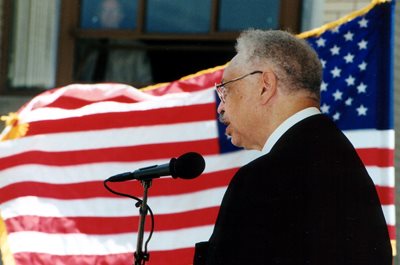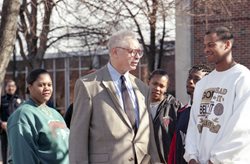 Leon Sullivan, an African-American Baptist minister, author and civil rights leader, was born in Charleston, West Virginia, in 1922. The seeds of Sullivan’s activism were planted as a child when he was denied the right to have a soda and sit at a counter in a drug store on Charleston’s Capitol Street. It was then that he decided he would stand up for what he believed in and the people he believed in.
Leon Sullivan, an African-American Baptist minister, author and civil rights leader, was born in Charleston, West Virginia, in 1922. The seeds of Sullivan’s activism were planted as a child when he was denied the right to have a soda and sit at a counter in a drug store on Charleston’s Capitol Street. It was then that he decided he would stand up for what he believed in and the people he believed in.
He graduated from the former Garnet High School and went on to attend West Virginia State University on a basketball scholarship, although his playing career was cut short due to an injury. He was able to finish his education by working at a steel mill to pay for it.
In 1943 Sullivan moved to New York and attended Union Theological Seminar from 1943-1945 and Columbia University where he received his master’s in Religion in 1947. While in New York he met his wife, Grace, and they later had three children Julie, Hope and Howard.
While in New York with the support of then Mayor Fiorello LaGuardia he was able to recruit 100 African-American men for the Harlem police force.
His biggest accomplishments began a few years later when he began to pastor the Zion Baptist Church in Philadelphia. He served as pastor there for 38 years and became known as “the Lion of Zion.” Church attendance rose during that time period from 600 to 6,000 members and became one of the largest churches America.
In 1958 he organized what became known as “selective patronage” after he asked companies in the Philadelphia area to interview young African-Americans for job openings and only two companies complied. The selective patronage slogan was “Don’t buy where you don’t work.” If a company refused to employ African-Americans then they boycotted the company. Within four years it was estimated that selective patronage resulted in the creation of jobs for thousands of African-Americans.
After the success of selective patronage, Sullivan realized what African-Americans needed most was a way for them to overcome the barriers that were forced upon them when trying to enter the workforce. In 1964 he founded Opportunities Industrialization Centers (OIC) of America. Located in an abandoned jailhouse in North Philadelphia it was a place that offered training and hope to those who otherwise didn’t have any job skills. Now OIC has more than 60 programs nation-wide, and has helped more than two million people gain the life and job skills needed. From the formation of OIC the Opportunities Industrialized Centers International (OICI) was formed in 1969.
In 1971 Sullivan joined the Board of Directors of General Motors (GM). With that he became the first African-American to ever sit on the board of a major corporation. He served on the board for 20 years, and during that time developed what would become known as the “Sullivan Principles.” The Sullivan Principles is a code of corporate social responsibility that demanded the equal treatment of employees regardless of their race both within and outside of the workplace. The Principles were designed to lobby GM and other large companies to discontinue business in South Africa as long as apartheid was still practiced there. Later in 1997, he introduced the Global Sullivan Principals of Social Responsibility. This expanded version of the code calls for the multinational companies to take a more active stance on social injustices and human rights. This was adopted by the United Nations in 1999.
Sullivan received many honors during his lifetime including the Presidential Medal of Freedom, the highest award that can be bestowed upon a civilian, from President George H.W. Bush in 1992. He also recieved the four Freedoms Award from the Roosevelt Institute, and the Eleanor Roosevelt Award for Human Rights presented by President Bill Clinton. In 2000 the former Broad Street in Charleston, was renamed Leon Sullivan Way in his honor. WVSU’s Sullivan Hall is also named in his honor.
Sullivan died April 24, 2001.